英语人教版必修三 Unit 2 Grammar
新教材2023年高中英语 Unit 3 Section Ⅱ课件 新人教版必修第三册
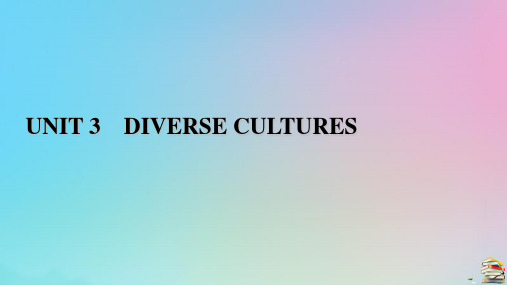
—I won’t join them. ——我不和他们一起。 —Why(will you not join them)? ——为什么(你不和他们一起)?
6.动词不定式 —Are you going there? ——你打算去那里吗? —Yes,I’d like to(go there). ——是的,我想(去那里)。 —I saw her enter the classroom. ——我看见她进了教室。
2.简洁实用 (I’m) Coming. (我)来啦。 (It) Doesn’t matter. (它)不要紧。 3.句法允许 He got up at six(o’clock). 他六点(钟)起床。 This dictionary costs seven(dollars) thirty(cents). 这本词典的费用是7美元30美分。 What a hot day(it is)! 多热的天呀!
UNIT 3 DIVERSE CULTURES
Section Ⅱ Discovering Useful Structures
单元语法精析 语法专题练习
单元语法精析
知识概览
Grammar——省略
探究发现 ①And what a city(it is)—a city that was able to rebuild itself after the earthquake that occurred in 1906. ②My hotel is near downtown,in the Mission District,(which is) one of the oldest parts of the city. ③This district used to be a poor area of town,but (this district) is now a centre for art,music,and food. ④(It is) A real mix of cultures here! ⑤What great food (it is)! ⑥(I) Can’t wait!
高中英语必修3人教版同步练习及答案:Unit 2 Healthy eating Grammar
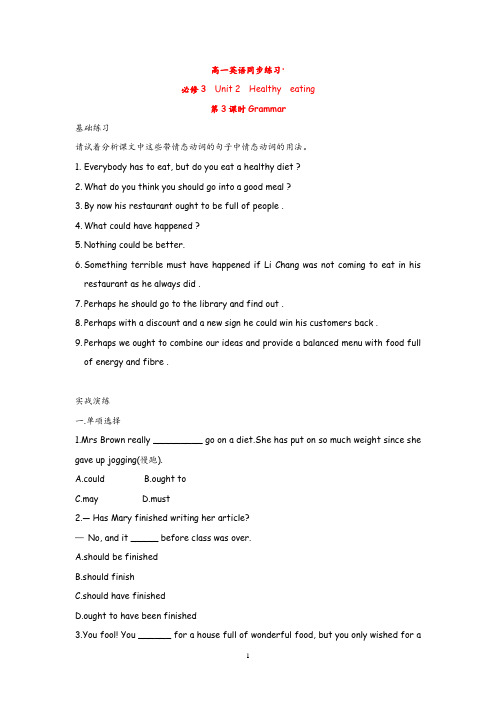
高一英语同步练习:必修3 Unit 2 Healthy eating第3课时Grammar基础练习请试着分析课文中这些带情态动词的句子中情态动词的用法。
1. Everybody has to eat, but do you eat a healthy diet ?2. What do you think you should go into a good meal ?3. By now his restaurant ought to be full of people .4. What could have happened ?5. Nothing could be better.6. Something terrible must have happened if Li Chang was not coming to eat in his restaurant as he always did .7. Perhaps he should go to the library and find out .8. Perhaps with a discount and a new sign he could win his customers back .9. Perhaps we ought to combine our ideas and provide a balanced menu with food full of energy and fibre .实战演练一.单项选择1.Mrs Brown really _________ go on a diet.She has put on so much weight since she gave up jogging(慢跑).A.couldB.ought toC.mayD.must2.— Has Mary finished writing her article?—No, and it _____ before class was over.A.should be finishedB.should finishC.should have finishedD.ought to have been finished3.You fool! You ______ for a house full of wonderful food, but you only wished for acake.A .could wish B.could have wished C.can wish D.may wish4.What is the way George thought of ______ enough money to buy the house?A.to getB.gettingC.having gotD.being got5.—What do you think of his opinion?—None has given me ___________ piece of advice.A.a betterB.a bestC.the bestD.the better6.— Which is ___________, China or Russia?—Russia is ___________ than China, I think.rger; largerB.the largest; largerC.the lager;the largerD.the larger; larger7.I thought I was going to fail the exam, but I passed _______.A.above allB.after allC.in allD.first of allst summer holiday, I went back to my hometown, ________ the neighbours and the house ________ I used to be familiar with were gone.A.only finding; whichB.only to find; thatC.to find; whomD.found; that9.—Let’s go to a movie after work, OK?— _____________A.Not at all.B.Why not?C.Never mind.D.What of it?10.Nuclear science should be developed to benefit the people ______ harm them.A.more thanB.rather thanC.other thanD.better than11.—Didn’t you enjoy the performance last night?—___________.It was less wonderful than expected.A.Yes, I didB.No, I didn’tC.Yes, I didn’tD.No, I did12.Thi s project ________ considered thoroughly, and I’m sure it ________ finished on time.A.must be; may beB.should be; can beC.may be; must beD.can be; should be13.I was really anxious about you.You _______ home without a word next time.A.mustn’t leaveB.shouldn’t have leftC.couldn’t have leftD.needn’t leave14.It was very kind of you to do the washing-up, but you ________ it.A.mustn’t have doneB.wouldn’t have doneC.mightn’t have doneD.didn’t have to do15.It was ______ that they all went swimming in the river.A.such a hot weatherB.such hot weatherC.so hot weatherD.so hot a weather二.单句改错1.They mustn’t have been in the library because I saw them on the playground .2.At last he could finish the work ahead oftime .3.What a terrible weather we have been having !4.My brother left the school at the age of fifteen ,so he hasn’t much knowledge .5.Thought it was very cold ,but he went out without an overcoat .6.His book is different from me .三.句式变换根据A句句义,完成B 句, 使句义相同或相近。
英语人教版高中必修三(2019新编)-2

普通高中英语(2019版)必修第三册Unit 2 Morals and Virtues 教学设计Period 3 Discovering Useful Structures该板块的活动主题是“描述人物的行为”( Describe people's actions)。
无论是谈论道德规范还是人物的美德品质,往往都需要通过故事来展现,因为只有对人物的言行进行生动而细致的描写,才能深入地刻画人物的性格、品质和精神。
动词-ing形式作宾语补足语和状语都可用于描述人物的行为。
因此,本单元选择该核心语法结构是由单元主题引领下的语篇题材和体裁特点决定的。
1. Able to understand the function and meaning of the adverbial and object complement in the -ing form;2. Can use the -ing form to describe the behaviors, actions, causes, objectives, results and accompanying conditions of the characters;3. Master the meaning and usage of the vocabulary in this part.Importance:1. Guide the students to understand the function and meaning of -ing form as object complement and adverbial;2. Guide the students to correctly use the -ing form to describe the behaviors, actions, causes, objectives, results and accompanying conditions of the characters.Difficulties:1. Correct use of the -ing form as an object complement and an adverbial in context;2. Use the -ing form correctly to describe a person's actions, actions and experiences.1. Review the use of the -ing form as attributive and predicate;2. Read the text in advance to understand the function and meaning of the -ing form as an object complement and an adverbial.3. Understand new words in context.Step 1 Revision1.Ss read the following sentences and discuss the meaning and grammatical function of the italic -ingform in the sentence, and summarizes the usage of the -ing form as attribute and predicate.*We are not allowed to speak aloud in the reading room.*There is a swimming pool in our school.*Her job is keeping the lecture hall as clean as possible.*Her duty is taking care of the babies.2.T shares the meanings and functions of the -ing form in each sentences.The first two sentences: The -ing form is an attribute.The last two sentences: The -ing form is used as a predicate.Step 2 Learning new grammarActivity 11. Group observation and discussion.Students read and observe the three sentences in activity 1. Groupsdiscuss the grammatical function of the -ing form in the three sentences.As the attribute:As the adverbial: 1、2As the object complement: 3As the predicative:2. Look for other sentences in the passage that contain the -ing form of the verb and are used as anobject complement or adverbial.①To a person nothing is more precious than their life,and if they entrust me with that life,how could Irefuse that trust, saying I’m cold,hungry,or tired? (As the adverbial.)②At times she was even seen riding a donkey to faraway villages to provide medical care. (As theobject complement.)③The new People’s Republic of China saw Dr Lin Qiaozhi playing a key role. (As the objectcomplement.)④Though Lin Qiaozhi never married,she was known as the “mother of ten thousand babies”,havingdelivered over 50,000 babies in her lifetime. (As the adverbial.)Step 3 PracticeActivity 21. Students complete activity 2, discuss the content in pairs, and then check the answers.Read thecomplete sentence and explain the grammatical function of the sentence.(Check the answers:1.Hearing; 2.worrying; 3.wanting; 4.knocking; 5.Facing; 6.Returning; 7.smiling;8.Feeling )2. The teacher asks the students to complete the grammar activity 1 on page 68 of the exercise book topractice the meaning and grammar function of the -ing form of the verb.(Check the answers:1. tiring, tiring; 2.shocking; 3.listening; 4.playing; 5.interesting, interested;ing,shouting,lying )Step 4 Summarizing一、动词-ing形式作状语动词-ing形式作状语时,可以表示时间、原因、结果、条件、方式或伴随动作。
人教版高一英语必修3宾语从句与表语从句详细讲解及练习

Grammar 宾语从句与表语从句名词性从句在复合句中起名词作用的从句叫做名词性从句。
名词性从句的作用相当于名词,因此主语从句、表语从句、宾语从句和同位语从句分别作主句的主语、表语、宾语和同位语。
主语从句:Who will win the match is still unknown.宾语从句:I want to know what he has told you.表语从句:The fact is that we have lost the game.同位语从句:The news that we won the game is exciting.引导名词性从句的连接词可分为三类:连接词(不充当从句的任何成分):that ,whether ,if连接代词:what, who, whom, whose, which, wh+ever连接副词:when ,where ,how ,whyObject Clauses 宾语从句请对应写出句子成分I know him.()()()I know who he is.()()()请用横线画出下面句子的宾语从句部分。
1、I know him.2、Do you have the time?3、I think that she is beautiful.4、Why don’t you pay attention to me?总结:宾语通常位于谓_____________或者_____________后一、宾语从句的概念:宾语从句在复合句中作主句的宾语。
位置:通常放在主句谓语动词(及物动词)或介词之后。
句子结构:主句+连词(引导词)+ 宾语从句e.g. She asked if these answers were right.We can learn what we do not know.He will talk to us about what he saw in the U.S.A.I don’t know where we will hold the meeting.通过观察,我们可以知道宾语从句的语序用陈述语序:连接词+主语+谓语+其他成分练习:1)Could you tell me______.A. you will get here whenB. when will you get hereC. get here when you willD. when you will get here2) Mother asked his son what ______for lunch at school.A. did he hadB. does he hadC. he hasD. he had3) Pointing to the young plant, he asked me ____ that was the one we had seen in the picture.A. whatB. ifC. whereD. how二、连接词1、从属连接词(不充当从句的任何成分):that ,whether ,if1)、I hear (that) he will be back in an hour.2)、I want to know if /whether he will go to the park with us注:1、由that 引导的陈述句性的宾语从句,在很多动词如say, think, wish , hope, see, believe, agree, expect, hear , feel等动词后。
人教版高中英语必修三全套教案

Module3 Unit 1 Festivals around the worldTeaching aims and demands1.topic: 1>Festivals2> how festivals begin3>how to celebrate festivals2.function: 1>RequestEg: Could you please…?Could I have …? I look forward to doing…2>ThanksEg: It’s a pleasure. /Don’t mention it.It’s very kind of you to…I’d love to …Thank you very much./Thanks a lot.You are most welcome.3.vocabulary:4.grammar:Jin can speak English well. (ability)Could you please show me the way to …? (request)May we see the awards for the team? (permission)She might give you … (possibility)The whole family will come for dinner. (promise)Often he would dress up like a rich man. (pass habit)We would be there with our friends. (promise)II.Key pointsPeriod 1-2 Warming up and fast reading1.Greetings2.Warming upStep 1 discussing the following questionsa.How was your holiday/spring festival?b.Did you go traveling?c.How much pocket money did you get?Step 2 talking1). Name some festivalsSpring Festival Dragon Boat Festival Lantam Festival Mid-Autumn Festival Army Day May Day Teachers’ Day New Year National Day Mother’s Day Children’s Day Father’s D ay Christmas Day Halloween carnival Easter Valentine Day Oben2).Ss work in groups of four and list five Chinese festivals and siscuss when theytake place , what they celevrate and one thing that people do at that time. Festivals Time of year/date Celebrate for Things to do Mid-Autumn DaySpring FestivalDragon Boat DayTomb sweeping DayLantern Festival3.Pre-reading1) What’s your favourite holiday of the year? Why?2) What festivals or celebration do you enjoy in your city or town? Do you likespending festivals with your family or with friends? What part of a festival do you like best—the music, the things to see, the visits or the food?4. Fast reading and find the answers to the following questions.A.What did ancient festivals celebrate?B.What are festivals of the dead for ?C.Why are autumn festivals happy events ? three things people do at spring festival ?Period 3-4 Intensive reading1.Read the passage paragraph and find the main ideas of each paragraphParagraph 1: All kinds of celebration in ancient time.Paragraph 2: The purpose to honour the dead and three examplesFestivals Time Things people doObenDay of the DeadHalloweenParagraph 3: The reasons Why we honour peopleFestivals Who does it celebrate ?Dragon Boat FestivalsClumbus DayIndian National FestivalParagraph 4: Autumn festivals are happy eventsParagraph 5: How people celebrate in spring festivals2.Language pointsa.They would starve if food was difficult to find…starve (v.)饿死;挨饿eg. Millions of people starved to death during the war.Starve for sth 渴望…Eg. The homeless children starve for love.Starvation (n.) 饿死Eg. Die of starvationStarvation wages 不够维持基本生活的工资b.The most ancient festivals would celebrate the end of the cold weather, plantingin spring and harvest in autumn.Celebrate (vt./vi.) 庆祝,赞颂,赞美,举行(仪式)Eg.We celebrate the new year with a party.Their courage was celebrated in all the newspaper.Celebrated (adj.) = famous 著名的,驰名的c. …because they thought these festivals would bring a year of plenty.days/years/…of plenty :富裕(尤指事物和钱)的日子,年月,生活等。
新人教高中英语必修三Unit2 Morals and Virtues单元分析
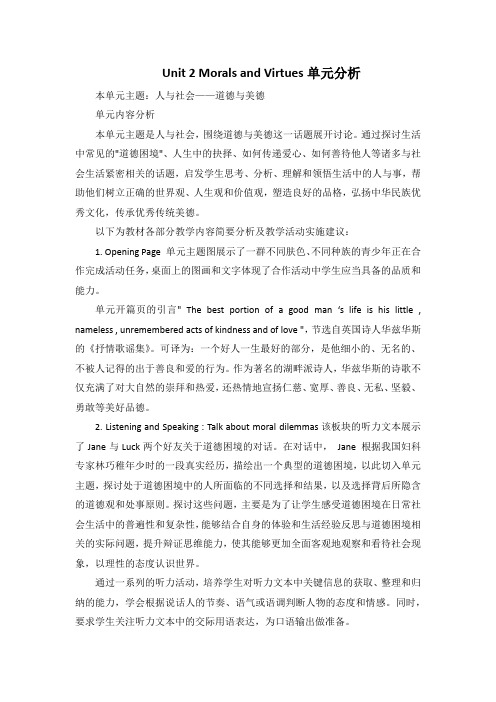
Unit 2 Morals and Virtues单元分析本单元主题:人与社会——道德与美德单元内容分析本单元主题是人与社会,围绕道德与美德这一话题展开讨论。
通过探讨生活中常见的"道德困境"、人生中的抉择、如何传递爱心、如何善待他人等诸多与社会生活紧密相关的话题,启发学生思考、分析、理解和领悟生活中的人与事,帮助他们树立正确的世界观、人生观和价值观,塑造良好的品格,弘扬中华民族优秀文化,传承优秀传统美德。
以下为教材各部分教学内容简要分析及教学活动实施建议:1. Opening Page 单元主题图展示了一群不同肤色、不同种族的青少年正在合作完成活动任务,桌面上的图画和文字体现了合作活动中学生应当具备的品质和能力。
单元开篇页的引言" The best portion of a good man ‘s life is his little , nameless , unremembered acts of kindness and of love ",节选自英国诗人华兹华斯的《抒情歌谣集》。
可译为:一个好人一生最好的部分,是他细小的、无名的、不被人记得的出于善良和爱的行为。
作为著名的湖畔派诗人,华兹华斯的诗歌不仅充满了对大自然的崇拜和热爱,还热情地宣扬仁慈、宽厚、善良、无私、坚毅、勇敢等美好品德。
2. Listening and Speaking : Talk about moral dilemmas该板块的听力文本展示了Jane与Luck两个好友关于道德困境的对话。
在对话中,Jane 根据我国妇科专家林巧稚年少时的一段真实经历,描绘出一个典型的道德困境,以此切入单元主题,探讨处于道德困境中的人所面临的不同选择和结果,以及选择背后所隐含的道德观和处事原则。
探讨这些问题,主要是为了让学生感受道德困境在日常社会生活中的普遍性和复杂性,能够结合自身的体验和生活经验反思与道德困境相关的实际问题,提升辩证思维能力,使其能够更加全面客观地观察和看待社会现象,以理性的态度认识世界。
译林版高中英语必修三Unit2 Grammar and usage 教案

《英语》(必修·第三册)Unit 2 Natural disastersGrammar and usageI. Learning objectivesBy the end of the lesson, students will be able to:1. understand the functions of to-infinitives as attributives and adverbials of result;2. use to-infinitives as attributives and adverbials of result properly in different situations;3. rewrite a passage using to-infinitives.II. Key competence focusUse to-infinitives as attributives and adverbials of result correctly and properly.III. Predicted area of difficulty1. Use to-infinitives as attributives and adverbials of result in new situations.2. Rewrite a passage using to-infinitives.IV. Teaching proceduresStep 1 Lead-inT: Hello, everyone. Last period we read two news reports about the lucky escapes from two natural disasters. First, I’d like to show your some sentences in these two news reports.•Alice Brown, head teacher at Falmont Primary School, was teaching when the floor began to shake.•The moment the shaking stopped, Miss Brown sensed it was the best time for the class to make their escape.•She signalled to her students to exit the classroom in an orderly line covering their heads with their hands.•The kids were calm enough to protect themselves during the earthquake.•“We practise earthquake safety procedures twice a year,” said Miss Brown, “so the kids were calm enough to protect themselves during the earthquake.”T: In all these sentences, there’re to-infinitives used as different sentence elements. In today’s class, we will explore the rules concerning to-infinitives as attributives and adverbials of result and learn to use them in different situations.【设计意图:学生在初中阶段已经接触过动词不定式的一部分用法,所以先在学生相对熟悉的语境中呈现含有动词不定式的句子,然后再呈现新的语法知识——动词不定式作定语和结果状语,用这个方法帮助学生建立新旧知识之间的联系,从而顺利过渡到新知识的学习。
人教版必修三 Unit 2 Reading for Writing

7. The girl pushed the stone with all her might. with all one’s might: with all the strength and power 全力以赴地,竭尽全力地
e.g. *He fought back with all his might. 他倾尽全力反击。
6. The king was in despair. despair n. a feeling that you have no hope at all 绝望 in despair 处于绝望中 e.g. A person is most disappointed when he is in despair. 一个人在绝望时最失望。 despair vi. to feel that there is no hope at all 绝望,感到无望 despair of doing sth / despair of sb e.g. *Despite his illness, Ron never despaired. *The teachers began to despair of him. *They’d almost despaired of finding the child.
young girl moving the stone to
the side of the street
tired, surprised
Response
went away
limped away in tears
nobody made an attempt to move the stone wanted to find the owner of the gold
2019-2020学年高中英语人教版必修三unit2知识点详解练习
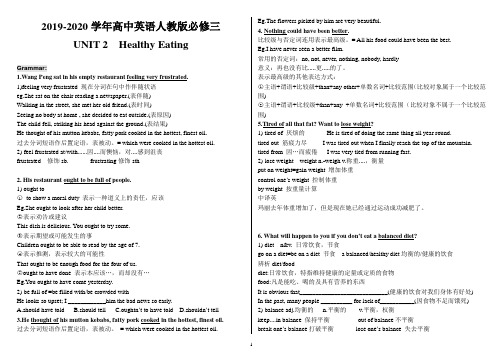
2019-2020学年高中英语人教版必修三UNIT 2 Healthy EatingGrammar:1.Wang Peng sat in his empty restaurant feeling very frustrated.1)feeling very frustrated 现在分词在句中作伴随状语eg.She sat on the chair reading a newspaper.(表伴随)Walking in the street, she met her old friend.(表时间)Seeing no body at home , she decided to eat outside.(表原因)The child fell, striking his head against the ground.(表结果)He thought of his mutton kebabs, fatty pork cooked in the hottest, finest oil.过去分词短语作后置定语,表被动。
= which were cooked in the hottest oil. 2)feel frustrated at/with......因....而懊恼,对....感到沮丧frustrated 修饰sb. frustrating修饰sth2. His restaurant ought to be full of people.1) ought to○1to show a moral duty 表示一种道义上的责任,应该Eg.She ought to look after her child better.○2表示劝告或建议This dish is delicious. You ought to try some.○3表示期望或可能发生的事Children ought to be able to read by the age of 7.○4表示推测,表示较大的可能性That ought to be enough food for the four of us.○5ought to have done 表示本应该…,而却没有…Eg.You ought to have come yesterday.2)be full of =be filled with/be crowded withHe looks so upset; I ____________him the bad news so early.A.should have toldB.should tellC.oughtn’t to have toldD.shouldn’t tell3.He thought of his mutton kebabs, fatty pork cooked in the hottest, finest oil. 过去分词短语作后置定语,表被动。
人教版英语必修三教案

人教版英语必修三教案【篇一:人教版英语必修3全套教案】人教版英语必修3 unit1-5 教案unit 1 festivals around the worldteaching aims and demands1.topic: 1festivals2 how festivals begin3how to celebrate festivals2.function: 1requesteg: could you please…?could i have …?i look forward to doing…2thankseg: it?s a pleasure. /don?t mention it.it?s very kind of you to…i?d love to …thank you very much./thanks a lot.you are most welcome.3.vocabulary:4.grammar: 情态动词的用法jin can speak english well. (ability)coul d you please show me the way to …? (request)may we see the awards for the team? (permission)she might give you … (possibility)the whole family will come for dinner. (promise)often he would dress up like a rich man. (pass habit)we would be there with our friends. (promise)ii.key pointsperiod 1 warming up and fast reading1.greetings2.warming upstep 1 discussing the following questionsa.how was your holiday/spring festival?b.did you go traveling?c.how much pocket money did you get?step 2 talking1). name some festivalsspring festival dragon boat festival lantam festival mid-autumn festivalarmy day may day teachers? daynew year national day mother?s daychildren?s day father?s daychristmas day halloween carnivaleaster valentine day oben2).ss work in groups of four and list five chinese festivals and siscuss when they take place , what they celevrate and one thing that people do at that time. then fill in the blanks.festivals time of year/date celebrate for things to domid-autumn dayspring festivaldragon boat daytomb sweeping daylantern festival3.pre-reading1) what?s your favourite holiday of the year? why?2) what festivals or celebration do you enjoy in your city or town? do you like spending festivals with your family or with friends? what part of a festival do you like best—the music, the things to see, the visits or the food?4. fast reading and find the answers to the following questions.a.what did ancient festivals celebrate?b.what are festivals of the dead for ?c.why are autumn festivals happy events ? three things people do at spring festival ?period 2-3 intensive reading1.read the passage paragraph by paragraph and find the main ideas of each paragraphparagraph 1: all kinds of celebration in ancient time.paragraph 2: the purpose to honour the dead and three examplesfestivals time things people doobenday of the deadhalloweenparagraph 3: the reasons why we honour peoplefestivals who does it celebrate ?dragon boat festivalsclumbus dayindian national festivalparagraph 4: autumn festivals are happy eventsparagraph 5: how people celebrate in spring festivals2.language pointsa.they would starve if food was difficult to find…starve 〔v.〕饿死;挨饿eg. millions of people starved to death during the war.starve for sth 渴望?eg. the homeless children starve for love.starvation (n.) 饿死eg. die of starvationstarvation wages 不够维持基本生活的工资b.the most ancient festivals would celebrate the end of the cold weather, planting in spring and harvest in autumn.celebrate (vt./vi.) 庆祝,赞颂,赞美,举行〔仪式〕eg.we celebrate the new year with a party.their courage was celebrated in all the newspaper.celebrated (adj.) = famous 著名的,著名的c. …because they thought these festivals would bring a yearof plenty.days/years/?of plenty :富裕〔尤指事物和钱〕的日子,年月,生活等。
Unit+2+Grammar+and+usage+课件-牛津译林版(2020)必修第三册

4.不定式作定语
I need a pen to write with. The meeting to be held tomorrow is important. I am so busy I have no time to write a letter.
不定式作定语通常放在其修饰的名词或代词之后。 不定式作定语与被修饰的名词或代词之间是主谓关 系、动宾关系、同位关系或修饰关系。
她是唯一获准进入委员会的人。
Practice
1. Do you know who is the first Chinese __to__w_a_l_k_ (walk) on the moon? 2. Do you have anything __t_o_s_a_y__(say)? If not, we will put an end to the meeting. 3. He has no friend __t_o__d_e_p_e_n_d_o_n___(depend). 4. Are you going to the meeting __t_o_b_e__h_e_ld___(hold) next week? 5. The new building __to__b_e_c_o_m__p_l_e_te_d__ ( complete) next year will be a city museum. 6. There may be an opportunity for you __to__s_ee__ (see) the famous star.
5.He considered it his duty __t_o_c_a_r_e__(care) about the homeless kids. 6.We think it necessary ___t_o_i_n_c_re_a_s_e_(increase) the salary.
高中英语 Unit 2(Healthy Eating)教案人教版必修三 教案
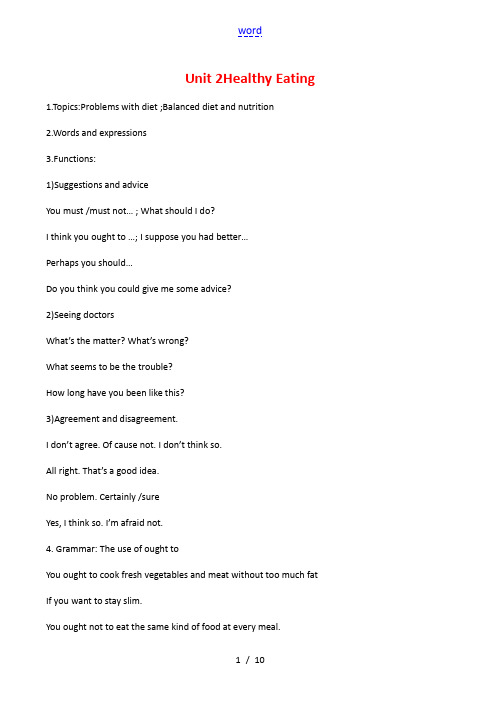
Unit 2Healthy Eating1.Topics:Problems with diet ;Balanced diet and nutrition2.Words and expressions3.Functions:1)Suggestions and adviceYou must /must not… ; What should I do?I think you ought to …; I suppose you had better…Perhaps you should…Do you think you could give me some advice?2)Seeing doctorsWhat’s the matter? What’s wrong?What seems to be the trouble?How long have you been like this?3)Agreement and disagreement.I don’t agree. Of cause not. I don’t think so.All right. T hat’s a good idea.No problem. Certainly /sureYes, I think so. I’m afraid not.4. Grammar: The use of ought toYou ought to cook fresh vegetables and meat without too much fat If you want to stay slim.You ought not to eat the same kind of food at every meal.Period 1.Step 1. warming up1. Do you eat a healthy diet? What kind of food do you usually have for meals? Are the food you usually eat healthy food or unhealthy food?(Discuss in pairs)2. Name some healthy food and unhealthy food.healthy food unhealthy food.All vegetables: cabbages, Fatty food: French friesPeppers tomatoes potatoes cream roast pork/lambAll fruits: apples, grapes sugary food:chocolateStrawberries bananas pears sweets/honey ice-creamDairy products:Milk cheese salty food:can biscuitSeafood: shrimp cookiesTofu eggs3. Do you know that the food you eat helps you grow in different ways? Some will make you fat/tall/thin.Look at the charm below,and see which kind of food they.FOOD TO GIVE YOU ENERGY FOOD TO GROW BONESAND MUSCLE Foods that fiber fordigestion and healthFast energy food Slow energy food Body-building food Protective foodsRice sugarNoodles potatoesSpaghetti breadCorn dumplings Butter creamOils ham nutsFried bread stickFried cake/chips Dairy products:Milk cheeseMeat eggs tofuSeafood shrimp All vegetables(eg.beans, Cucumbers,mushrooms,peas, Cabbage,…)all fruit(pears Apples, peaches, oranges,…)Questions:1.Which of these groups of food do you like best?2.Which of them do you eat most often?3.Do you think we should eat each kind of food?3.What will happen if you do not eat a balanced diet?Too much fatty/sugary/salty food will cause many diseases and get too fat.Only protective food will feel weak ,no energy and get too thin.Step 2. Pre-reading1. Discuss the questions in the chart.(Which food contains more…)2. Order the following food from which contains most fat to which contains less.Answer: ice-cream, eggs, chicken, rice, peachesStep 3 Fast reading and answer the following questions1. What does Wang Pengwei’s restaurant serve?2. What about Yong Hui’s restaurant?Step 4 Intensive reading and find the answers to prehending.Period 2 Language pointsStep 1.Lead-in: Listen to the tape to get a better understanding.Step nguage points1.Wang Pengwei sat in his empty restaurant feeling very frustrated.feeling very frustrated 现在分词在句中作伴随状语eg.She sat on the chair reading a newspaper.(表伴随)Walking in the street, she met her old friend. (表时间)Seeing no body at home, she decided to eat outside.(表原因)The child fell, striking his head against the ground. (表结果)2.His restaurant ought to be full of people.Ought to 1) to show a moral duty 表示一种道义上的责任,应该Eg.She ought to look after her child better.You ought to study hard to get a high mark.2)ought to have done 表示本应该…,而却没有…Eg.You ought to have e yesterday.3.He thought of his mutton kebabs, fatty pork cooked in the hottest oil. 过去分词短语作后置定语,表被动。
最新2019-2020学年人教版英语必修三Unit2_Grammar课时作业有答案-(高一)
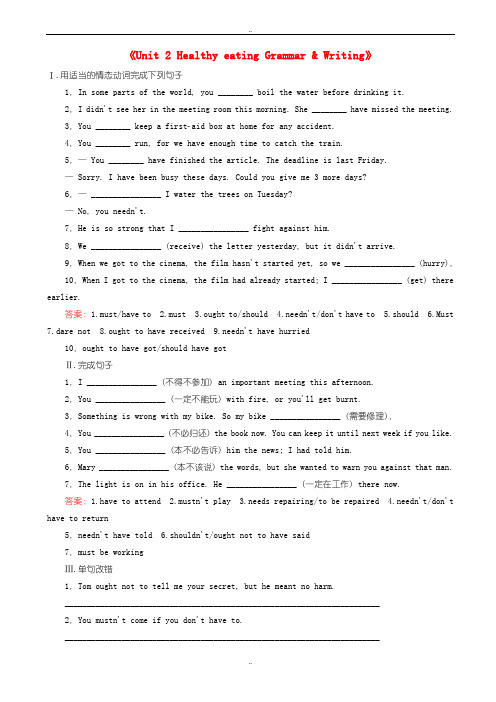
《Unit 2 Healthy eating Grammar & Writing》Ⅰ.用适当的情态动词完成下列句子1.In some parts of the world, you ________ boil the water before drinking it.2.I didn't see her in the meeting room this morning. She ________ have missed the meeting.3.You ________ keep a firstaid box at home for any accident.4.You ________ run, for we have enough time to catch the train.5.— You ________ have finished the article. The deadline is last Friday.— Sorry. I have been busy these days. Could you give me 3 more days?6.— ________________ I water the trees on Tuesday?— No, you needn't.7.He is so strong that I ________________ fight against him.8.We ________________ (receive) the letter yesterday, but it didn't arrive.9.When we got to the cinema, the film hasn't started yet, so we ________________ (hurry).10.When I got to the cinema, the film had already started; I ________________ (get) there earlier.答案:1.must/have to 2.must 3.ought to/should 4.needn't/don't have to 5.should 6.Must 7.dare not 8.ought to have received 9.needn't have hurried10.ought to have got/should have gotⅡ.完成句子1.I ________________ (不得不参加) an important meeting this afternoon.2.You ________________ (一定不能玩) with fire, or you'll get burnt.3.Something is wrong with my bike. So my bike ________________ (需要修理).4.You ________________ (不必归还) the book now. You can keep it until next week if you like.5.You ________________ (本不必告诉) him the news; I had told him.6.Mary ________________ (本不该说) the words, but she wanted to warn you against that man.7.The light is on in his office. He ________________ (一定在工作) there now.答案:1.have to attend 2.mustn't play 3.needs repairing/to be repaired 4.needn't/don't have to return5.needn't have told 6.shouldn't/ought not to have said7.must be workingⅢ.单句改错1.Tom ought not to tell me your secret, but he meant no harm.________________________________________________________________________2.You mustn't come if you don't have to.________________________________________________________________________pick them up and throw them into the bin (垃圾箱).”Hamburger Harry visits children in hospitals and tells them funny stories. His restaurants give wonderful birthday parties. Parents telephone the restaurant or go there. They choose a good day for the party, arrange the food and drink and send invitations to friends. Hamburger Harry sometimes comes to the party with a bag of presents and a big birthday cake. The boys and girls sit round the tables and eat all their favorite food. They all wear paper hats and party badges(徽章). Hamburger Harry dresses in green, red and yellow and he wears two big badges. He works hard at the party. He tells jokes, sings songs and gives everyone a present. The children get colored pencils, balloons and books to draw on. They always have a good time.Their parents enjoy the party too because they don't prepare the tables and they don't cook the food. They don't have to clean the restaurant after the party. All they do is pay the bill.1.Harry's hamburgers are sold ________.A.without drinksB.at a high priceC.in the same styleD.with different tastes2.If a child holds a birthday party at Harry's restaurant, Harry may ________.A.give a big cake to the child as a giftB.ask his workers to sing for the childC.play a joke on the child for funD.decorate the restaurant with balloons3.Why do parents enjoy the party held by Harry's restaurants for their children?A.Because they don't have to pay the bill.B.Because there are many friends in the party.C.Because they can enjoy delicious cakes in the party.D.Because they don't need to do many things by themselves.4.What is the text mainly about?A.A famous cook named Harry.B.Delicious Harry's hamburgers.C.Harry and his famous restaurants.D.The birthday party in Harry's restaurants.答案与解析:1.解析:细节理解题。
Unit 2 Morals and Virtues 动词ing形式 高一英语(人教版2019必修三)

the –ing form used
as adverbial
读句子,思考以下问题: ①. V-ing 作状语可以表示哪些情况? ②. V-ing 作状语应注意什么?
1) Hearing the bell, the students rushed to the school canteen.
2) Not knowing the answer to this question , he turned to his deskmate.
3) The two girls stood there for half an hour talking about the boys who were playing basketball.
4) The COVID-19 broke out throughout the world, causing hundreds of thousands of deaths.
1.To learn the usage of V-ing form used as adverbial or object complement in a sentence.
2.To apply what we learn in this period to exercises, especially in writing, and grammar filling.
e.g. Granting this to be true, we cannot explain it. 虽然我们承认这是事实,却无法予以说明。
翻译句子: 虽然知道它很难,我也不放弃。 Although I _k_n_o_w__i_t_is__d_if_f_ic_u_l_t_, I don’t give up.
人教版高中英语必修三Unit-2全课件
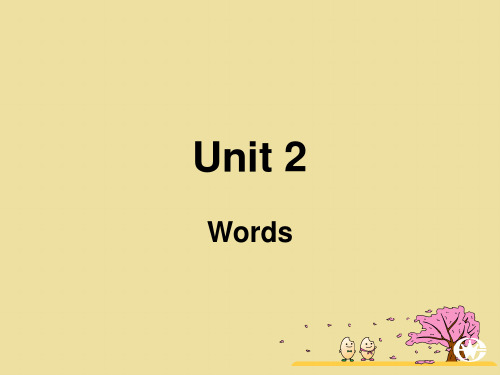
Part 1
Careful reading
Frustrated/empty
Careful reading: Part 1
feelings : He sat in his restaurant_f_e_e_li_n_g_ very _f_ru_s_t_ra_t_e_d__.
foods : _m__u_tt_o_n_k_e_b_a_b_s_, __r_o_a_st__p_o_rk____
……有益
• We should spend the money on something that will be beneficial to everyone.
• We should spend the money on something that will
• be of great benefit to everyone.
• I felt that I was totally cut off.
You are what you eat. 人如其食。 First wealth is health. 健康是人生的第一财富。 An apple a day keeps the doctor away. 一天一个苹果,医生不来找。
• He is lying in the bed. • Lay v.放置,下蛋,产卵,赌钱(laying, laid,
laid)
• Please lay the book on the table.
• The hens are laying in the nests.
• How much did you lay on the race.
• 你得权衡一下住在乡下的好处和坏处。 • keep one’s balance保持平衡 • lose one’s balance失去平衡
高一英语新人教版 必修三 Unit2 MORALS AND VIRTUES
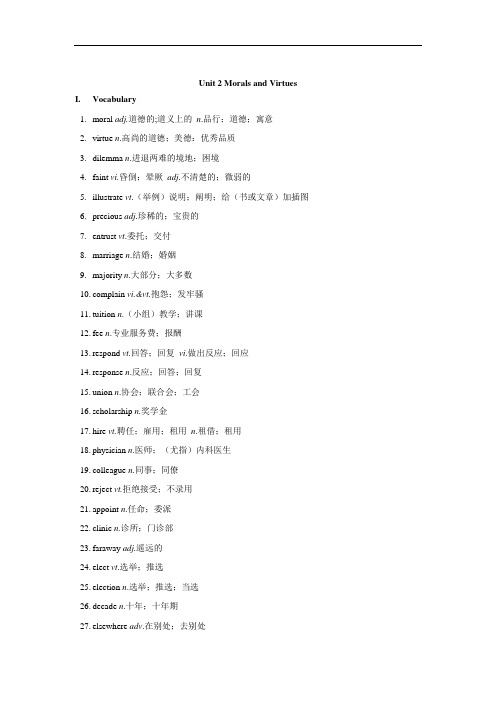
Unit 2 Morals and VirtuesI.Vocabulary1.moral adj.道德的;道义上的n.品行;道德;寓意2.virtue n.高尚的道德;美德:优秀品质3.dilemma n.进退两难的境地;困境4.faint vi.昏倒;晕厥adj.不清楚的;微弱的5.illustrate vt.(举例)说明;阐明;给(书或文章)加插图6.precious adj.珍稀的;宝贵的7.entrust vt.委托;交付8.marriage n.结婚;婚姻9.majority n.大部分;大多数plain vi.&vt.抱怨;发牢骚11.tuition n.(小组)教学;讲课12.fee n.专业服务费;报酬13.respond vt.回答;回复vi.做出反应;回应14.response n.反应;回答;回复15.union n.协会;联合会;工会16.scholarship n.奖学金17.hire vt.聘任;雇用;租用n.租借;租用18.physician n.医师;(尤指)内科医生19.colleague n.同事;同僚20.reject vt.拒绝接受;不录用21.appoint n.任命;委派22.clinic n.诊所;门诊部23.faraway adj.遥远的24.elect vt.选举;推选25.election n.选举;推选;当选26.decade n.十年;十年期27.elsewhere adv.在别处;去别处28.tend vt.照顾;照料vi.倾向;趋于29.publish vt.发表(作品);出版30.staff n.员工;全体职员31.retire vi.&vt.退休;退职;退出32.saving n.节省物;节省;节约;[pl.]储蓄金;存款33.kindergarten n.学前班;幼儿园34.principle n.道德原则;法则:原则35.passive adj.被动的;顺从的36.scared adj.害怕的.....感到惊慌或恐惧的37.scare vt.惊吓:使害怕vi.受惊吓38.sharp adj.(增长、下跌等)急剧的;锋利的;明显的39.insurance n.保险:保险业40.energetic adj.精力充沛的:充满活力的41.replace vt.接替;取代:更换42.accident n.事故:车祸:失事43.operation n.手术;企业经营44.whisper vi.&vt.悄声说;耳语:低语n.耳语(声);低语(声);传言;谣传45.midnight n.子夜;午夜46.import n.进口;进口商品vt.进口;输人;引进47.export n.出口;出口商品vt.出口;输出;传播48.pole n.(行星的)极;地极p n.(坐着时的)大腿部;(跑道等的)一圈50.bite vt.&vi.咬;叮;蜇n.咬;(咬下的)一口;咬伤51.lip n.嘴唇52.assist vt.帮助;援助53.chairman n.主席;主持人;董事长54.memory n.记忆力;回忆55.chain n.连串(人或事);链子:链条56.café n.咖啡馆;小餐馆57.waitress n.(餐馆的)女服务员;女侍者58.pregnant adj.怀孕的:妊娠的59.disguise vt.装扮;假扮;掩盖n.伪装;化装用具60.maple n.枫树;槭树61.cart n.手推车;运货马车62.spill vt.&vi.(使)洒出;(使)溢出63.limp vi.跛行;一瘸一拐地走64.tear n.眼泪;泪水65.harm n.&vt.伤害;损害66.despair n.绝望vi.绝望;感到无望67.might n.力量;威力68.fable n.寓言;寓言故事69.court n.(网球等的)球场;法院;法庭70.flexible adj.灵活的;可变通的71.income n.收入;收益72.per prep.每;每一73.therefore adv.因此;所以74.tension n.紧张关系:紧张:焦虑II.Phrase1.illustrate vt.(举例)说明:阐明:给(书或文章)加插图illustrate...with... 用......给......加插图by way of illustration(= as an example)作为例子2.carry sb.through sth. 帮助某人渡过难关3.majority n.大部分;大多数be in a/the majority 占大多数the majority of(=most of)大多数4.respond vt.回答;回复vi.做出反应;回应respond to...with...用......对......做出反应in response to 作为......的回答/答复5.hire vt. 聘任;雇用;租用n.租借;租用hire sb.to do sth. 雇用某人做某事on hire from 从.....租用6.appoint vt. 任命;委派appoint sb.to do sth. 任命某人做某appoint sb.as...任命某人为......7.elect vt.选举;推选elect sb.as sth. 选举某人担任某职务elect to do sth. 决定做某事8.tend vt.照顾;照料vi.倾向,趋向tend to/towards 趋向;倾向;走向tend to do sth. 往往会做某事9.principle n.道德原则;法则:原则in principle 原则上;理论上:大体上;基本上on principle 按照原则;根据原则10.sharp adj(增长、下跌等)急剧的;锋利的;明显的keep a sharp eye on sb.密切注意某人have a sharp tongue 说话尖锐11.whisper vi.&vt.悄声说;耳语;低语n.耳语(声);低语(声);传言;谣传whisper about sth.小声说某事in a whisper= in whispers 耳语地;低声地12.assist vt.帮助;援助assist sb.in doing sth.帮助某人做某事with the assistance 在.....的帮助下13.pass away 去世14.in memory of 作为对....的纪念15.step by step 一步一步地,逐步地;逐渐地.16.disguise vt.装扮;假扮;掩盖n.伪装;化装用具disguise oneself as 把自己装扮成in disguise 伪装;假装;装扮17.pick up 拾起;捡起;拿起;学会;接收;整理18.trip over 被......绊倒19.despair n.绝望vi.绝望;感到无望drive sb.to despair 使某人陷入绝望in despair 处于绝望中20.a great deal(of)大量III.Sentence1.“would rather+do”结构a.Would rather 后接动词原形,意思是“宁愿”,是表示意愿的交际用语。
高中英语(新教材)人教版选择性必修第三册学案:Unit 2Speaking and Listening Talking (含解析)
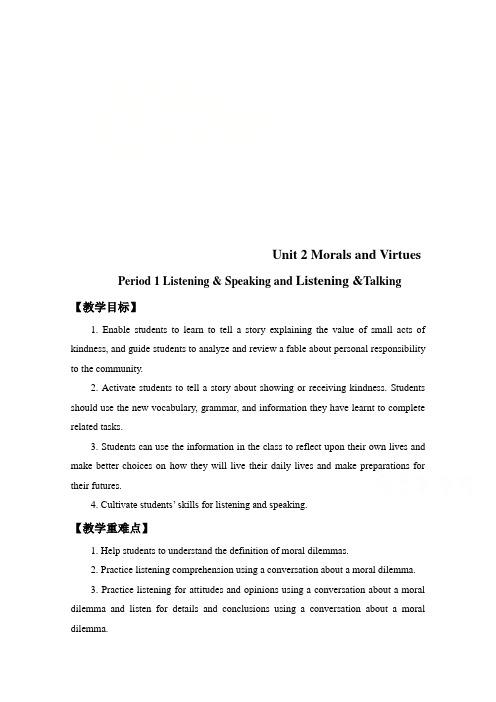
Unit 2 Morals and Virtues Period 1 Listening & Speaking and Listening &Talking 【教学目标】1. Enable students to learn to tell a story explaining the value of small acts of kindness, and guide students to analyze and review a fable about personal responsibility to the community.2. Activate students to tell a story about showing or receiving kindness. Students should use the new vocabulary, grammar, and information they have learnt to complete related tasks.3. Students can use the information in the class to reflect upon their own lives and make better choices on how they will live their daily lives and make preparations for their futures.4. Cultivate students’ skills for listening and speaking.【教学重难点】1. Help students to understand the definition of moral dilemmas.2. Practice listening comprehension using a conversation about a moral dilemma.3. Practice listening for attitudes and opinions using a conversation about a moral dilemma and listen for details and conclusions using a conversation about a moral dilemma.4. Guide students to know that how to affect others by own benevolence; moreover, if so, better social atmosphere will be created.学习过程Part 1: Listening and Speaking1. Before students listen to the tape, look at the definition and picture below. Then discuss the questions with their group.(1) What moral dilemma is the boy in the picture facing?(2) Have you ever faced a moral dilemma or heard of someone who did? Describe it. 2. Listen to the conversation and complete the table to describe the moral dilemma thatJane is talking about.3. Listen again and decide whether the statements are true [T] or false.4. Listen to the conversation carefully and answer the questions.5. Think about what you would do if you were ever faced with the same situation as thegirl. Then share your thoughts with your group, and explain the reasons for your choice.Example:A: If I were ever in a situation like the girl faced, I think I would choo se to…B: Why? Are you sure?C: Because I think that…is most important. What about you?B: I think I would…Pronunciation1. Listen to the conversations and match each rising intonation with its meaning.2. Read the conversation and mark in correct places. Then listen to the recording to check. Notice the meaning of each rising intonation.Part 2: Listening and TalkingTalk about the importance of kindness1. Listen to a radio show and answer these questions.(1) What is the name of the radio show?(2) What does “paying it forward” mean?(3) What does the guest want the listeners to do?2. Listen to the radio show again and fill in the blanks to complete the story.3. Think of a story of showing or receiving kindness, either your own story or one that you have heard of. Then share it with your group. Here are some words and expressions that may help you.。
人教版(2019 )高中英语必修第三册 grammar 非谓语动词之doing

➢ She shouted out, and run away. ➢ She shouted out, running away. ➢ To enlarge its campus, Dongguan Middle School pulled down the old teaching
现在分词表示主语的性质,翻译为“令人……” 动名词侧重表示经常性 to do侧重表示将来具体的某一次
定语
➢ a walking stick ➢ a walking woman ➢ The girl sitting under the tree is my sister.
动名词:表示用途或者性质 现在分词:表示正在进行的动作
只接doing的动词: recommend, appreciate, quit, mind, give up, adapt to, look forward to, be addicted to……
宾语
部分动词两者都可,但意义不同。 a) remember, regret, forget (做过/还没做) b) stop, go on (同一件事/另一件事) c) Can’t help to do/ doing d) mean to do/ doing
➢ I mean to go shopping tomorrow.
➢ The success means working hard.
表语
➢ My hobby is listening to Chinese opera. ➢ The news is shocking. ➢ My dream is to have an office of my own in the CBD.
- 1、下载文档前请自行甄别文档内容的完整性,平台不提供额外的编辑、内容补充、找答案等附加服务。
- 2、"仅部分预览"的文档,不可在线预览部分如存在完整性等问题,可反馈申请退款(可完整预览的文档不适用该条件!)。
- 3、如文档侵犯您的权益,请联系客服反馈,我们会尽快为您处理(人工客服工作时间:9:00-18:30)。
不同的“肯定”程度可按下列层次排列:
He is at home. (事实) He must be at home.(非常肯定的推断) He could be at home.(很可能) He ought to be at home.(很可能) He may be at home.(仅仅可能而已) He might be at home.(或许, 非常不确定) He couldn’t be at home.(很可能不在家) He can’t be at home.(一定不在家) He isn't at home.(事实)
4.--Is John coming by train?
--He should, but he ____ not. He
likes driving his car.
泰坦尼克号应该是部好电影。 Titanic _s_h_o_u_ld_ be a good movie.
We know if we keep at it we _s_h_o_u_l_d_ succeed. 我们知道如果我们坚持 下去就应该会成功。
冬天的时候,我们不得不 穿上温暖的衣服。 We _h_a_v_e_t_oput on warm clothes in winter.
How dare you to say such a thing?
He daren’t to speak English before such a crowd, did he?
He daren’t speak English before such a crowd, dare he?
表示推测——情态动词的重要用法
+V.
can’t/
couldn’t
+ V./+ be doing
对过去 + have done
疑问的
推测
+ V.
can/could
+ V./+ be + have done doing
在不表示推测的情态动词中, 我们要注 意以下方面的问题:
1. 表示能力、许可的情态动词的用法。 2. 表示否定的情态动词的用法。 3. shall 和 will 的多种意义的区别。 4. 情态动词短语的使用。 5. 虚拟语气中情态动词的使用。
5. 用于虚拟语气的情态动词: should might could would needn’t ought to
1. I thought you _____like something
to read, so I have brought some
books.
A. may
B. might
C. would
That was why he dared do so. 那就是他为什么敢这样做的原因。
Mother dare(d) not tell father she‘d given
away his old jacket. 母亲不敢告诉父亲她把他的旧上衣送人了。
dare后通常不接动词的进行式。
判断正误:
Nobody need to be afraid of catching the disease. Nobody need be afraid of catching the disease.
These dishes need be cleaned carefully. These dishes need to be cleaned carefully. These dishes need cleaning carefully.
How dare you say such a thing?
You _h_a_v_e__to_ mix the flour and the butter. 你必须把面粉和黄油和在一起。
In England traffic _m_u__st_ keep to the left. 在英国,车辆必须 靠左行驶。
All passengers _m__u_s_t_ wear seat belts. 所有乘客都必须系安全带。
1. 表示能力、许可的情态动词的用法。 表示能力: can, could, be able to be able to 能用于各种时态。 can / could 只能表示现在或过去的能力。
was / were able to 设法做成某事
相当于 managed to do sth.
succeeded in doing sth.
We must dare to think, speak and act. 我们必须敢想、敢说、敢做。
I wonder how he dares (to) say such things. 我纳闷他怎么竟敢说出这样的话来。
dare的过去式问题 情态动词dare可以有过去式dared,但也可 以直接用dare表示过去式,或后接动词完 成式。如:
ቤተ መጻሕፍቲ ባይዱeed / dare
情态动词 (+动词原形)
1.无人称和数的变化; need 2.尤其用于:
*否定句及疑问句中;
*在if/whether之后; .
*或与hardly, never,
dare
no one, nobody连用; 3.常以needn’t 和daren’t
的形式出现;
4.dare有其过去时dared.
3. 情态动词shall, will 的多种意义:
shall / will+ 动词原形: 均可表示将来。 过去时为 should, would。 shall 可表示必须、命令、警告或征询意见。 will 可表示意愿、常出现的动作、在疑问 句中表示请求和建议。
4. 情态动词短语的使用: would like to do… would rather do… would rather + 从句 would prefer to do... had better do...
Unit 2
Modal Verb II
Fill in the blanks according to the Chinese.
我认为她应该向公众道歉。 I think she o_u_g_h__t _to_ apologise to the public.
You _o_u_g_h_t_t_o_ go and see the doctor. 你应当去找医生看看病。
情态动词 对将来 对现在 对过去
肯定的
推测 must
+ V. 常见 + V./+ be + have done must be doing
可能的 + V. 推测
+ V./+ be + have + doing done
may/might 可以用not表示“可能不”
情态动词 对将来 对现在
否定的
推测
表示许可: may / might, can / could might, could 比较委婉, 一般多用于疑 问句。 can, may 表达的语言比较随便。 在以could, might 表示征询对方意见 或表示请求时,回答应相应使用can, may。
2. 表示否定的情态动词的用法: 部分情态动词的否定式是情态动词中的 考点之一。 mustn’t 不准; 禁止 needn’t 没必要 ( = don’t have to ) can’t 不能; 不可能 may not 不可以; 可能不 shouldn’t 不应该 ( = ought not to )
上面的空你都填对了吗? 如此多的情态动词, 我们应当如何使用呢? 接下来就进行详细 的讲解。
ought to/should
should 和ought to 都为“应该”的意思, 可用于各种人称。ought to 的语气稍重 一些。 You ought to (should) follow your teacher’s advice.
行为动词
多用于肯定句;
(sb.) need to do dare to do
need to be done need doing
注意对need问句的回答: --Need I finish the work today? --Yes, _y_o_u__m_u_s_t________.
No, _y_o_u__n_e_ed__n_’t______. No, _y_o_u__d_o_n_’t__h_a_v_e_t_o_. needn’t 对其它情态动词的回答: --Shall I tell John about it? --No, you _n_e_e_d_n_’t__(d_o_n_’_t_h_a_v_e__to_)__. --Must we do it now? --No, you n_e_e_d_n_’_t_(_d_o_n_’_t_h_a_v_e_t_o_)__.
I daren’t ask her for a rise. 我不敢要求她加薪。
dare用作实意动词时意为“敢于”,可以 有各种词形变化,可用于各类句型(肯定 句、否定句、疑问句及各类从句等),其 后多接带 to 的不定式,有时 to 也可省去 (尤其是在否定句或疑问句),可用于非 谓语形式,完成时态等。如:
禁止,意思是“不能, 不许”。如: —Must I finish the task right now?
我现在必须完成这个工作吗? —Yes, you must. / Yes, you have to.
是的。 (—No, you needn’t. / No, you don’t
have to. 不, 不必。)
dare可用实意动词和情态动词,用作情 态动词时,意思是“敢”,其后接动词 原形,通常只用于否定句或疑问句以及if 或whether之后,一般不用于肯定句。如: Dare you tell her the truth? 你敢告诉她事实真相吗?
